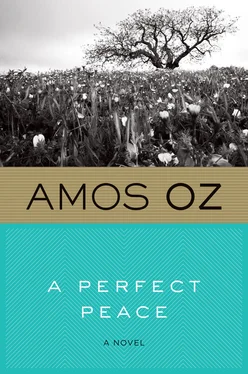The winter began to take hold. Yolek came down with the flu and suffered cruel pains in his back. One evening Yonatan dropped by, and Yolek berated him for not visiting more often, for refusing to take over the shed, for the nihilism of Israeli youth in general. Hava interrupted, "You look sad and tired, Yonatan. Maybe you should take a day or two off. Rimona deserves some rest too. Why don't you two go to Haifa? You can sleep at Uncle Pesach's and go to a movie."
"And get a haircut," added Yolek. "Look at you."
Whatever you leave behind will stay behind. All those personal effects that you won't be needing where you're going. As strange as your room will be without you, as strange and empty as the shelves that you made above your bed, as strange and dusty as the chessboard that you carved all last winter from the trunk of an olive tree, as strange as the garden with its iron poles on which you meant to trellis a grape vine and never did. Fear not. Time will pass. The curtains will fade in the assault of the sun. The magazines at the bottom of the bookcase will turn yellow. The crabgrass and the nettles and the weeds that you fought against all these years will again raise their heads in your backyard. Mildew will flower once more around the sink that you fixed. Plaster will peel. The railings on the porch will rust. Rimona will wait for you until she understands that it's senseless to wait any longer. Your parents will stubbornly blame her, each other, you, the times, the latest fads, but they too will finally make their peace. "Mea culpa," your father will exclaim in his Polish Latin. Your pajamas, your battle jacket, your work clothes, your paratrooper boots will be given away to someone your own size. Not to Udi! Maybe to that hired-hand Italian murderer who works in the metal shop. Other personal belongings will be packed in a suitcase and stored in that little closet above the shower. New routines will strike roots. Rimona will be sent to one of those kibbutz courses in applied art and soon be decorating the dining hall for parties and holidays. Your brother Amos will be discharged from the army and marry his girlfriend Rachel. Maybe he'll even make the national swimming team. Fear not. Meanwhile you will get to where you are going and see how different, and right, and fresh it all is. And what if ever on some distant day a memory comes to you of an old familiar whiff or the sound of dogs barking far off or a driving hailstorm at dawn and you suddenly fail to grasp what it is you have done, what madness might have possessed you, what devil lured you from your home to the end of the world?
It was raining hard. Orange picking came to a halt. The cheerful teenage girls were sent to the kitchen and the stockrooms. Udi volunteered to fix the tin roof of the cowshed and the sheep pen that had been blown away by the winds. And Yonatan Lifshitz agreed to take over the shed as his father had asked several weeks earlier. "I want you to know that this isn't a permanent arrangement," he said. "It's just for now."
To which Yolek replied, "Eh? Right! Good. Just get the place into shape, while we catch our breath. Who knows? Maybe you'll find an unknown source of self-fulfillment there. Maybe some day the fashions will change and that kind of work will be it again."
"Just remember," said Yonatan, "I haven't promised you anything."
And so Yonatan began to put in six hours a day in the tractor shed. There wasn't much to do except take routine care of the tractors and make an occasional repair if it was simple enough. Most of the other farm machinery, still and frozen, slumbered away the winter beneath the tin roof that rattled in the wind. The engine oil grew black and viscous. The instrument panels were clouded by vapors. You had to be out of your mind to try to wake these monsters from their sullen hibernation and get them running again. Let them rest in peace. I'm here because of the cold and the rain, he told himself, and not for long either.
At ten o'clock every morning he would slosh his way from the tractor shed to the metal shop to drink a cup of coffee with the lame Bolognesi and have a look at that day's sports section.
Bolognesi was not really an Italian. He was a Tripolitanian hired hand with a dark, stubbly face, a mouth that smelled slightly of arak, and a torn ear that resembled a rotten-ripe pear. A lanky, stooped man in his middle fifties, he lived by himself in a shack, one half of which had once housed a shoemaker, while the other half still served on occasion as a barbershop. Although he had served fifteen years for chopping the head off his brother's fiancée with an ax, the precise details of the affair were not known. Naturally, different and occasionally gruesome versions of it circulated. He wore a permanently pinched look, as if he had just bitten into a piece of spoiled fish that he could neither swallow nor spit out. Whether it was because he had become a pious Jew while in jail, or for some other reason, President Ben-Tsvi had decided to pardon him. In a letter to the kibbutz, the Committee for Re-formed Convicts had officially vouched for his character, and so he was taken on as a helper in the metal shop and given his tumbledown, tarpaper half of a shack to live in.
Since settling on the kibbutz, he had taken up in his free time the art of knitting he had learned in prison and made marvelous sweaters for the kibbutz children, and sometimes, for the young ladies, stylish outfits copied from knitwear magazines bought with his own money and studied carefully. He spoke little in his feminine voice and always with extreme caution, as if whatever he said might implicate him or embarrass you. Once, during their coffee break, Yonatan, without looking up from his newspaper, asked, "Say, Bolognesi, why do you keep looking at me like that?"
"Look your shoe," said the Italian with extraordinary delicacy, barely parting his lips. "Your shoe she's open and the water she gets inside. I fix'a your shoe right away?"
"Don't bother," said Yonatan. "Thanks anyway." He went right back to the debate between two sports columnists over the upset in yesterday's League Cup semifinals. Then he turned the page and started to read about a Jewish orthopedist from South America, also a football star, who had come to live in Israel and signed up with a Jerusalem team.
"I no fix'a, you no thank'a," insisted Bolognesi with melancholy logic. "Why you thank'a me like that? Wha' for?"
"For the coffee," said Yonatan.
"You want I should pour'a 'nother?"
"No thanks."
"Look. 'Scuse'a me, what you call'a this? Again you thank'a me for nothing? Wha' for? No fix'a, no thank'a. And no get'a mad neither."
"All right," said Yonatan. "No one's getting mad. But why don't you pipe down, Bolognesi, and let me read my paper in peace?"
And to himself he said: No giving in this time. Tonight. You'll do it tonight. Or, at the very latest, tomorrow night.
That afternoon, when Yonatan returned home, he lit the kerosene heater, washed his hands and face, and sat down to wait for Rimona in one of the twin armchairs, his legs wrapped in a brown woolen blanket against the cold. Spread before him was the morning paper, in which from time to time his eye would pick out some item that struck him with amazement. In one, the President of Syria, Dr. Nur-ad-Din el-Atassi, a former gynecologist, and the Foreign Minister, Dr. Yussuf Zu'ein, a former ophthalmologist, had both spoken before a large, frenzied rally in Palmyra to call for the extermination of the state of Israel, the ophthalmologist swearing in the name of all those gathered not to spare one drop of its blood, since blood alone could expunge its affront to the Arabs and rivers of blood had to be crossed if their own holy road were to lead to the sunrise of justice. In another, an Arab youth, on trial in Haifa for peeping through a window in a Jewish neighborhood at a woman getting undressed, defended himself in fluent Hebrew by citing the precedent of King David and Bathsheba. Judge Nakdimon Zlelichin, the newspaper related, was so tickled by this novel plea that he let the youngster off with a stern rebuke and a warning. In the corner of an inside page was an account of an experiment performed in the Zurich zoo, in the course of which unseasonable light and heat were admitted into the bears' house to test the depth of their hibernation: finally one bear awoke only to go mad.
Читать дальше












